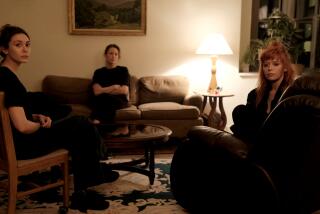At the intersection of grief and destiny

Red Hook Road
A Novel
Ayelet Waldman
Doubleday: 344 pp., $25.95
Ayelet Waldman is a worrier. Because she is the mother of four children, ages 7 to 16, that shouldn’t be surprising. Her last book, “Bad Mother,” a work of nonfiction, outlined many of the fears (intimate and not so intimate) that she harbors for each child and for her husband, writer Michael Chabon. It’s in her fiction, however, that Waldman really worries the subject of motherhood; gnaws at it, pokes fun at it.
Her “Mommy-Track Mysteries” series featured Juliet Applebaum, a criminal defense attorney turned stay-at-home mommy and amateur sleuth practicing her craft, with stroller, on the streets of L.A. Waldman was herself a federal public defender before staying home to raise her children and write. Though she has somehow written 11 books since 2000, so she’s either frighteningly organized or she has the kind of help other mothers try to poach, even in bucolic Berkeley, where the family lives. Both of her previous works of literary fiction wrap their plots around motherhood and family life. “Daughter’s Keeper” (2003) was published before Waldman wrote her infamous essay “Motherlove” (retitled “Truly, Madly, Guiltily” in the New York Times), in which she admitted to loving her husband more than she did her children. The uproar that ensued in the blogosphere is not worth describing here. In “Love and Other Impossible Pursuits” (2006), the author was clearly reeling from the hubbub; it was full of judgment and side-taking: Upper West Side versus Upper East Side; WASP versus Jew; good mother versus bad mother.
“Red Hook Road” is a quieter, more mature novel, which means more fully developed characters, more depth of plot, more wisdom. It is also a study of grief and begins with a tragedy. On the way from the church to the reception, a newlywed couple, Becca Copaken and John Tetherly, are killed in a car crash on a windy Maine coast road near Becca’s family’s summer home. This happens not in the first chapter but the Prelude. The first two chapters, then, allow us to know the two families a little before disaster strikes. Brimming with ominous references, both of these chapters are fully framed, wedding photographs in prose, and they will stay on your shelf of images (next to Robert Altman’s film “A Wedding”) for the rest of your days.
What next? The living stagger on, but Waldman focuses on middle-class Jane, the mother of the groom, and Iris, Becca’s mother, a stiff-spined professor of comparative literature whose family has been coming to Red Hook, Maine, for three generations (not nearly enough to be truly accepted into the community). Her husband of 33 years, Daniel, is a warmer, if less professionally successful person than his wife. Her younger daughter, the bride’s sister Ruthie, even at 21, has been rendered co-dependent on her extremely capable mother. John’s brother, Matt, has been accepted to Amherst but chooses to stay home and finish working on the yacht that John was building. Jane’s sister Connie is in and out of mental institutions and has a 9-year-old daughter that she had adopted from Cambodia named Samantha, who proves to be an extremely talented violinist and carries what little hope the Copaken and Tetherly families have for the future.
That’s the cast of characters, and Waldman makes them memorable enough; she is a shrewd observer of human behavior, particularly matriarchs and their progeny. Her portrait of Red Hook, however, is more cartoonish. “In Maine the division between local people and summer people was as stark [as the Hamptons], but much more complicated. The locals were the ones who viewed the from-aways with a certain amount of disdain, and it was the from-aways who, in some sense, scrambled for approval.” It’s a movie version of a New England summer community, and Waldman doesn’t do the class clashing justice.
However, Iris, Waldman’s well-meaning control freak, is well-drawn. She has aggressively guarded her position, but one feels she’d like to shed it, once and for all. Daniel, too, has burdens he’d like to shed; the boat is a huge burden on Matt; Becca’s great promise is an enormous burden on her younger sister. Survival itself is a burden.
Lovely is the relationship between Samantha and Iris’ father, a famed violinist with war-related tragedies in his past. It feels organic, as though it grew out of the writing process. This is important, for “Red Hook Road” is, like its matriarch, very tightly wound. When a writer grips a novel too tightly, like a child, it becomes frightened and pale. Waldman, however, loosens her grip in the end as the characters come to stand on their own, talk back to her, say no to her. She lets them loose, no need to worry.
Salter Reynolds is a writer in Los Angeles.
More to Read
The biggest entertainment stories
Get our big stories about Hollywood, film, television, music, arts, culture and more right in your inbox as soon as they publish.
You may occasionally receive promotional content from the Los Angeles Times.










